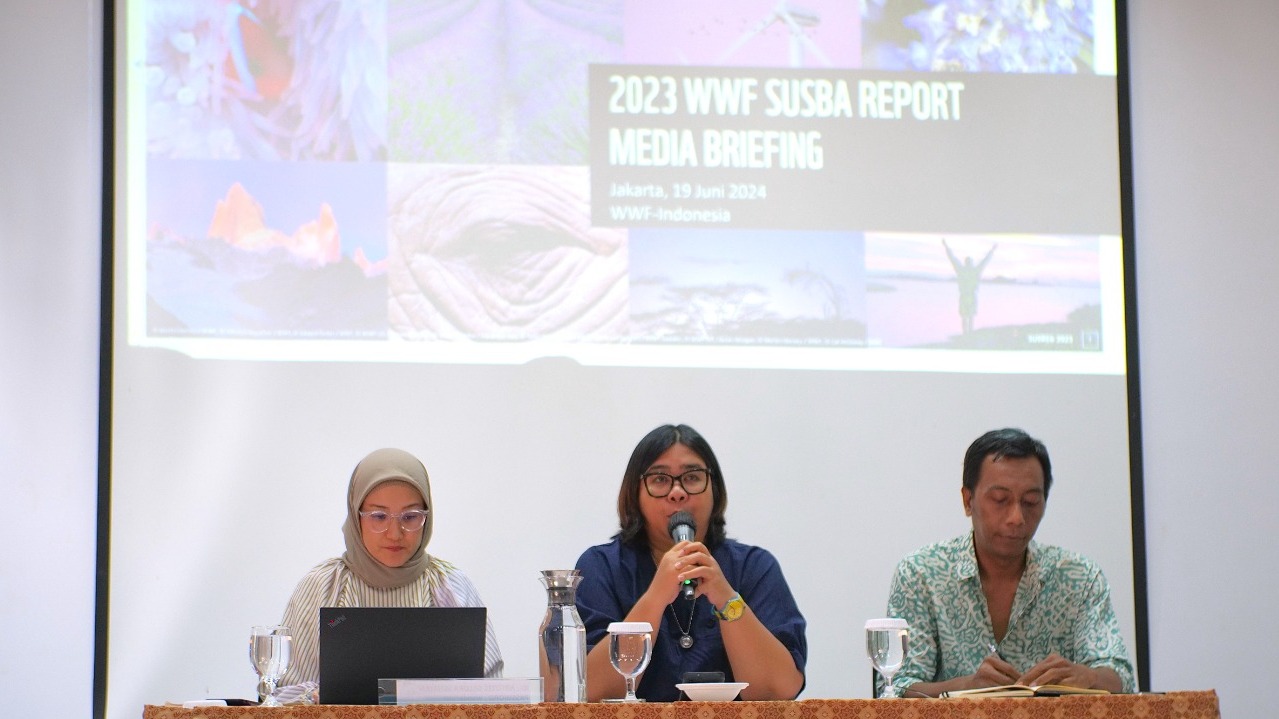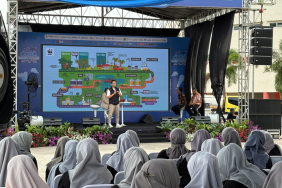SUSTAINABLE BANKING ASSESSMENT (SUSBA) 2023 REPORT: BANKS' ABILITY TO MANAGE CLIMATE CHANGE RISKS NEEDS TO BE STRENGTHENED
Jakarta, June 20, 2024 - WWF has released the 7th Sustainable Banking Assessment (SUSBA) report, a comprehensive assessment of the integration of environmental, social, and governance (ESG) aspects of 39 banks in ASEAN countries and 10 major banks in Japan and South Korea.
Specifically for Indonesia, SUSBA 2023 includes 11 private and state-owned banks, the highest number of respondents in the entire ASEAN and East Asia region. The latest SUSBA report saw the addition of three banks (BTPN, BSI, and Bank Danamon) compared to the previous year.
Of the 11 banks, only four are committed to achieving net zero. Furthermore, the development of financial products that support the net zero transition is still limited, especially for small and medium scales. Also, the risk of natural and biodiversity impacts on financial performance is not yet an urgency for most banks in Indonesia.
SUSBA has six pillars - (Purpose, Policy, Process, People, Product, and Portfolio) to measure the progress of ESG integration in the banking sector.
Climate Change Risks to the Banking Sector
Indonesia is geographically vulnerable to climate change. Based on the country's climate change vulnerability score (ND-GAIN 2021), which measures vulnerability and preparedness to physical climate risks, Indonesia needs to strengthen climate actions. The private sector is no exception with transition risks such as global regulatory dynamics, rapid technological development, and changing market conditions.
"The performance of banks, as financial intermediaries, is not immune from exposure to these climate change risks. Changes in markets and policies related to fossil fuels, for example, are a risk that banks need to take into account," - said Dewi Rizky, Chief Conservation Officer, WWF-Indonesia.
"Therefore, banks need to increase their capacity to identify and manage the two main risks of climate change and environmental degradation. At the same time, banks also play an important role in increasing the resilience of other sectors to climate change," added Dewi.
The net zero target will not be achieved without real steps to maintain environmental conditions. Based on SUSBA 2023, banking support to reduce negative impacts on nature and society is still very limited (5%).
One of the positive findings of SUSBA shows that the highest management of banks (Directors and Commissioners) already have functions and responsibilities to manage ESG and climate change risks. However, banks' capacity to measure the level of these risks is still minimal and needs to be improved.
The SUSBA report shows that only four banks have net zero targets, namely BRI and BTPN by 2050, and BCA and BNI by 2060. Two banks (BCA and BRI) have calculated greenhouse gas (GHG) emissions, but only one bank (BRI) has implemented the Science-based Target Initiative (SBTi).
"Indonesian banks need to step up efforts on policies and procedures so that their customers have mitigation plans/action plans to achieve the Paris Agreement targets. Furthermore, small and medium industries involved in the supply chain deserve extra attention as they are generally labor-intensive and vulnerable to climate change risks," said Rizkia Sari Yudawinata, Sustainable Finance Lead, WWF-Indonesia.
Data from OJK and BPS shows that the ratio of credit to MSME groups will reach 12.38% of total banking assets by 2023.
Based on SUSBA 2023, specialized support channeled to small and medium enterprises (SMEs) in transitioning to sustainable practices is still very limited (27%). Without strong support, labor-intensive industries are vulnerable to exclusion. Banks need to develop products that are solutive and at the same time facilitate their move to implementing sustainable practices.
Media contact person:
Karina Lestiarsi, Communication Officer WWF-Indonesia
klestiarsi@wwf.id / +62 852-181-616-83
Editor's Note:
About SUSBA
Sustainable Banking Assessment (SUSBA), was first launched in 2017 to assess the progress of integration of social and environmental aspects in bank financing. SUSBA is one of the publicly accessible performance measurement instruments for the adoption of ESG principles in order to promote transparency in the financial sector and facilitate decision-making by stakeholders. SUSBA adopts international frameworks, standards and guidelines, such as those issued by the Global Reporting Initiative (GRI), United Nations Environment Programme Finance Initiative (UNEP FI), Task Force on Climate-related Financial Disclosures (TCFD), and Sustainability Accounting Standards Board (SASB). Full access for SUSBA Asia-Pacific region: https://www.wwf.sg/susba/
WWWF- Indonesia's Sustainable Finance Initiative
The WWF-Indonesia Foundation is one of the initiators of the Indonesia Sustainable Finance Initiative (IKBI), being the only civil society organization to be a part of it. WWF-Indonesia partners with Bank Indonesia and the Financial Services Authority (OJK), international institutions, and the domestic banking industry to accelerate the adoption of sustainable finance in the financial services sector.
About WWF Indonesia Foundation
The WWF Indonesia Foundation is an Indonesian incorporated civil society organization engaged in nature conservation and sustainable development. Our mission is to halt environmental degradation and build a future where people live in harmony with nature, through the conservation of the world's biodiversity, the sustainable use of renewable natural resources, and the reduction of pollution and overconsumption.
For the latest news, visit www.wwf.id and follow us on X (Twitter) @wwf_id | Instagram @wwf_id | Facebook WWF-Indonesia | Youtube WWF-Indonesia





